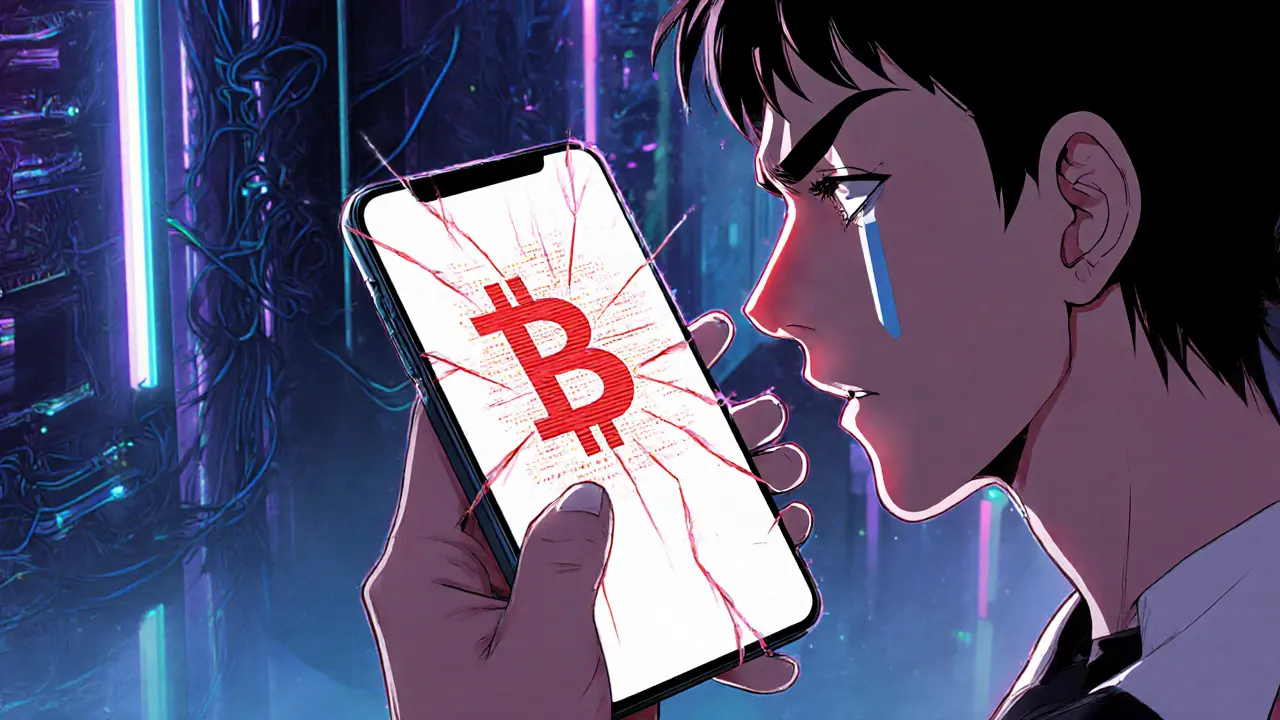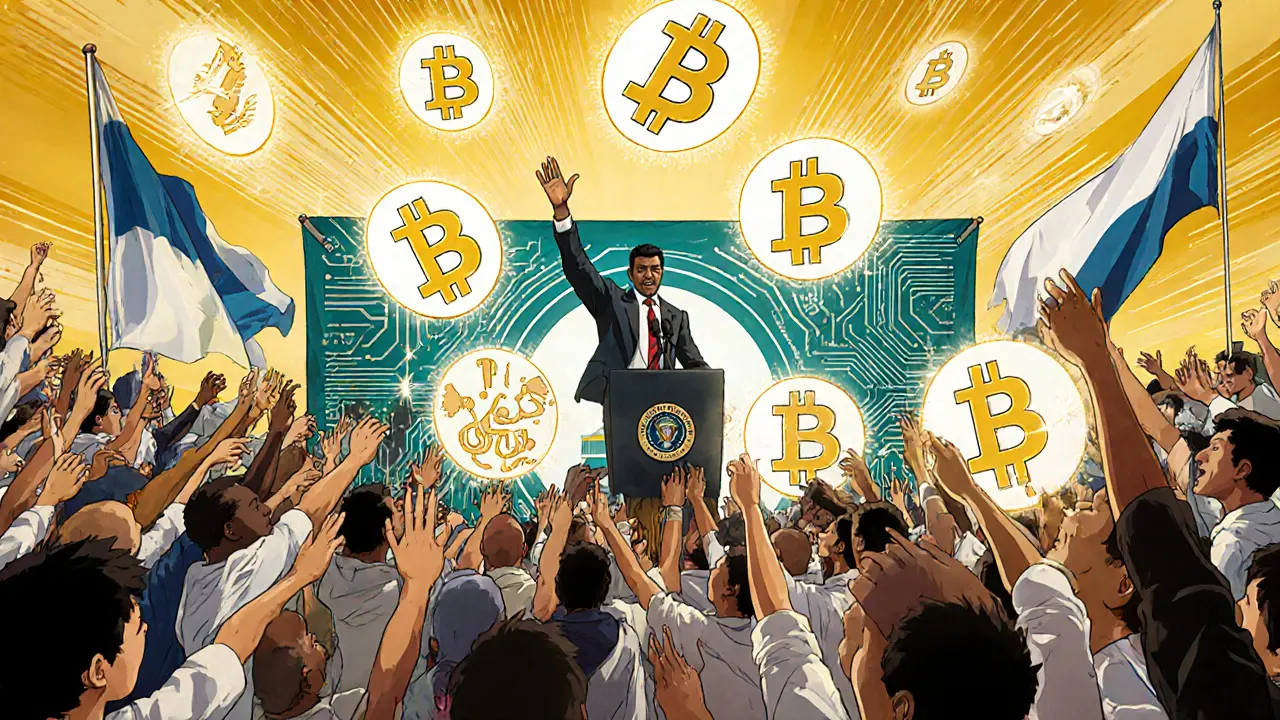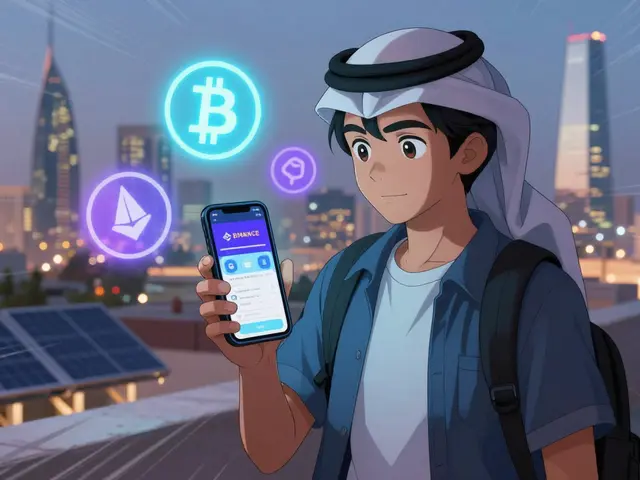El Salvador Bitcoin Legal Tender Impact Calculator
| Aspect | Before May 2025 (Legal Tender) | After May 2025 (Voluntary Use) |
|---|---|---|
| Merchant obligation | All businesses required to accept Bitcoin | Acceptance optional; no penalties |
| Tax payments | Can be settled in Bitcoin | Taxes must be paid in US dollars |
| Government purchases | Continued buying of BTC allowed | IMF-mandated freeze; no new purchases |
| Chivo wallet status | State-run, mandatory integration | Operates as a voluntary app; support winding down |
| Public perception | Highly polarized, protests against "crypto decree" | More neutral; focus on tourism and branding |
In September2021, the world watched as El Salvador a Central American nation of about 6.5million people became the first country to recognize Bitcoin the leading cryptocurrency, as legal tender alongside the US dollar. The policy was promoted as a shortcut to financial inclusion, a magnet for foreign investment, and a way to slash remittance costs. Six years later the experiment has been rolled back, but the story offers a rich lesson for any government or business flirting with cryptocurrency at scale.
Key Takeaways
- The original law forced all merchants to accept Bitcoin, creating massive compliance friction.
- Technical flaws in the government‑backed Chivo wallet a mobile app for Bitcoin transactions launched by the Salvadoran government eroded trust quickly.
- Volatility and low merchant uptake kept daily transaction volume under 2% of total retail sales.
- Pressure from the International Monetary Fund the global lender that provides financial assistance to its member countries forced a legislative amendment that stripped Bitcoin of its legal‑tender status in May2025.
- ElSalvador now treats Bitcoin as a voluntary private‑market asset, keeping the Chivo infrastructure alive mainly for tourism and crypto‑friendly branding.
Why the Government Went All‑In
President Nayib Bukele the 43‑year‑old president of El Salvador argued that a digital sovereign currency could bypass the country’s under‑banked population, which the World Bank estimates at roughly 70%. By making Bitcoin legal tender, the administration hoped to attract crypto investors, boost tourism, and showcase the nation as a tech‑forward hub.
The law, passed on 7September2021, required every retailer to accept Bitcoin for goods and services, and mandated that taxes could be paid in the cryptocurrency. The move was presented at a televised ceremony, with Bukele emphasizing that the policy would "bring the future to every Salvadoran home."
Building the Infrastructure: The Chivo Wallet
To operationalize the law, the state rolled out the Chivo wallet a government‑developed mobile application for sending, receiving, and storing Bitcoin. The app offered a $30 sign‑up bonus in Bitcoin and claimed to integrate the Bitcoin Lightning Network for instant, low‑fee payments. By early 2022, independent surveys suggested more Salvadorans owned a Lightning wallet than a traditional bank account, a headline that buoyed confidence in the project.
However, technical glitches surfaced within weeks. Users reported app crashes, lost private keys, and a high‑profile hacking incident in March2022 that drained several thousand dollars from user balances. Customer support was understaffed, and many users abandoned the platform after their first failed transaction.

Economic Impact and Financial Inclusion
The promised surge in financial inclusion never materialized. A 2024 IMF‑commissioned study found that only 8% of surveyed households used Bitcoin for everyday purchases, and 92% said they preferred cash or dollars. Remittance fees dropped marginally-by about 1.5%-but the reduction was insufficient to offset the volatility‑related costs that merchants faced.
ElSalvador’s Bitcoin reserves grew to a disputed figure. Official statements cited 688BTC (≈$574million) with $287million in reported profit, while independent watchdogs claimed the government held over 6,100BTC, valued near $500million as of March2025. The lack of transparent accounting fueled skepticism among both citizens and international investors.
Challenges on the Ground
Merchant resistance was the most visible hurdle. Small shops struggled to install point‑of‑sale software, train staff, and manage price volatility. A city‑wide survey in SanSalvador found that only 5% of businesses consistently accepted Bitcoin, and many who did revert to dollars after a single loss from price swings.
Beyond merchant friction, broader infrastructure gaps limited adoption. Only 62% of the population owned a smartphone capable of running the Chivo app, and internet reliability in rural areas hovered around 70% uptime, making real‑time Lightning payments unreliable.
Education efforts fell short. Government‑run workshops reached an estimated 12% of the adult population, leaving the majority without a clear understanding of private keys, transaction fees, or tax implications.
IMF Pressure and the Legal‑Tender Reversal
In December2024, ElSalvador secured a $1.4billion Extended Fund Facility from the International Monetary Fund the multilateral financial organization that provides policy advice and financing to its members. One of the IMF’s conditions was a rollback of the mandatory Bitcoin law. The Legislative Assembly voted 55‑2 on 12January2025 to amend the original statute, stripping the word “currency” and ending the requirement for businesses to accept Bitcoin. The changes took effect on 1May2025.
Economist Rafael Lemus a senior economist at the IMF who oversaw the ElSalvador program summed it up: "Bitcoin no longer has the strength of legal tender. It should have always been that way, but the government tried to force it into existence, and it didn't work."
BeforevsAfter: What Changed?
| Aspect | Before May2025 (Legal Tender) | After May2025 (Voluntary Use) |
|---|---|---|
| Merchant obligation | All businesses required to accept Bitcoin | Acceptance optional; no penalties |
| Tax payments | Can be settled in Bitcoin | Taxes must be paid in US dollars |
| Government purchases | Continued buying of BTC allowed | IMF‑mandated freeze; no new purchases |
| Chivo wallet status | State‑run, mandatory integration | Operates as a voluntary app; support winding down |
| Public perception | Highly polarized, protests against "crypto decree" | More neutral; focus on tourism and branding |

Global Context: How ElSalvador Stands Apart
Most nations adopt a "crypto‑friendly" regulatory stance rather than declare a digital currency as legal tender. Switzerland’s “Crypto Valley” offers tax incentives, Singapore’s MAS provides clear licensing, and the EU’s MiCA framework aims for compliance without forcing use. None of these jurisdictions require mandatory acceptance at the point of sale. The ElSalvador model was unique in its top‑down mandate, which turned the policy into a compliance exercise rather than an organic market development.
Academic reviews, such as the March2025 article in The Economist a weekly international publication known for economic analysis, labeled the experiment a failure, citing higher administrative costs than any measurable economic gain. Likewise, a Reuters interview with Quentin Ehrenmann of My First Bitcoin NGO highlighted that the country’s Bitcoin reserve “has had limited impact on the population”.
Current State (October2025)
ElSalvador continues to host crypto conferences, most notably the PLANB Forum 2025, which attracts developers, investors, and policy makers from across Latin America. The Chivo wallet remains downloadable, but the government has announced a gradual wind‑down of official support, shifting maintenance to a private consortium. Bitcoin can still be bought, sold, and held by anyone in the country, but it no longer enjoys any privileged legal status.
Recent IMF monitoring reports confirm that the government has not acquired new Bitcoin since the loan agreement, contradicting earlier rumors. The country’s focus now lies in leveraging its experience to attract fintech startups, rather than pushing a sovereign digital currency.
Lessons Learned and What’s Next
ElSalvador’s story offers three clear takeaways for policymakers:
- Mandates create friction. Forcing merchants to accept a volatile asset leads to low compliance and high operational costs.
- Technical reliability is non‑negotiable. A buggy wallet erodes trust faster than any marketing campaign.
- International partners matter. Without the backing of institutions like the IMF, a small economy struggles to absorb the macro‑risk of a cryptocurrency bull‑run or bust.
Future experiments may favor a hybrid approach: allowing voluntary crypto payments, providing clear consumer protection, and investing in digital literacy before scaling up. The ElSalvador case will likely be cited in academic curricula and policy briefings as a cautionary example of how not to implement a national crypto strategy.
Frequently Asked Questions
Did Bitcoin actually improve financial inclusion in ElSalvador?
No. Studies by the IMF and local surveys showed that less than 10% of the population used Bitcoin for daily transactions, and the unbanked remained largely excluded.
How much Bitcoin does the government still hold?
Official figures list 688BTC (about $574million). Independent analysts argue the number could be over 6,000BTC, but the exact amount remains disputed due to limited transparency.
Can merchants still be forced to accept Bitcoin?
No. The May2025 amendment removed the legal‑tender requirement, making acceptance optional and removing any penalties for refusal.
What happened to the Chivo wallet after the law changed?
The app stays available for voluntary use, but the government is winding down official support. Maintenance has been handed to a private consortium that aims to keep basic functionality for tourism and crypto enthusiasts.
Is ElSalvador still a good place for crypto startups?
Yes, the country markets itself as a regional hub for fintech and blockchain events, leveraging the notoriety of its Bitcoin experiment while offering incentives for new projects.
In short, the El Salvador Bitcoin legal tender saga demonstrates how bold policy can generate worldwide attention, yet without solid technical foundations, stakeholder buy‑in, and macro‑economic safeguards, even the most innovative ideas can stumble.







Cynthia Rice
April 25, 2025 AT 15:27The paradox of freedom lies in law's invisible chains.
John Corey Turner
April 26, 2025 AT 13:40Reading the case feels like watching a kaleidoscope of ambition and hubris.
El Salvador tried to paint itself as the avant‑garde of monetary innovation, yet the canvas was already riddled with cracks.
The Chivo wallet, despite its glittering $30 welcome bonus, turned into a digital pothole for everyday users.
What really hurts is how the IMF’s pragmatic caution morphed into a political sword, slicing away the very legality the experiment depended on.
In the end, the whole saga is a reminder that technology can’t outrun economics without a sturdy bridge of trust.
Kimberly Kempken
April 27, 2025 AT 11:54Everyone loves to trumpet “crypto freedom” while ignoring that most users were left holding volatile ash.
The government’s top‑down decree was less a policy and more a reckless gamble that left merchants trembling.
Twinkle Shop
April 28, 2025 AT 10:07The implementation of a sovereign cryptocurrency in a developing economy must be examined through a multidimensional lens that incorporates not only macro‑economic indicators but also sociocultural dynamics, infrastructural readiness, and regulatory elasticity.
Initially, the rhetoric surrounding Bitcoin’s adoption in El Salvador was imbued with technocratic optimism, positioning the nation as a pioneer in the digital monetary frontier.
However, the requisite technological scaffolding-namely broadband penetration, smartphone ubiquity, and digital literacy-was conspicuously insufficient, creating an operational chasm between policy intent and on‑the‑ground feasibility.
Empirical data from the IMF’s 2024 assessment underscores that merely 5 % of merchants consistently processed Bitcoin transactions, a figure that starkly contrasts with the 100 % compliance mandate stipulated by law.
Moreover, the volatility coefficient, quantified at a 2‑fold risk multiplier in the post‑analysis, translated into tangible fiscal exposure for both retailers and consumers, effectively nullifying the projected fee‑reduction benefits of the Chivo wallet.
From a governance perspective, the forced legal tender status eroded institutional legitimacy, as evidenced by public protests and a precipitous decline in political capital for President Bukele.
The subsequent IMF pressure, culminating in the May 2025 amendment, illustrates the pivotal role of external supranational actors in shaping domestic monetary policy trajectories.
Financial inclusion metrics further reveal a negligible shift: less than ten percent of the unbanked populace engaged with Bitcoin for routine transactions, thereby questioning the efficacy of the mandated digital inclusion strategy.
Transparency deficiencies regarding the nation’s Bitcoin reserves-officially reported at 688 BTC versus independent estimates exceeding 6,000 BTC-fostered an environment of distrust among both citizens and international investors.
In the realm of international comparative policy, El Salvador’s approach diverged sharply from the regulatory sandboxes employed by Switzerland, Singapore, or the EU’s MiCA framework, which prioritize voluntary adoption and consumer safeguards over coercive mandates.
Consequently, the experiment manifested as a regulatory outlier, generating amplified compliance costs without commensurate economic returns.
Post‑reversal, the Chivo wallet’s transition to a voluntary, tourism‑oriented application signals a strategic pivot towards niche market positioning rather than mass‑market financial integration.
Future policy recommendations therefore advocate for a hybrid model that couples voluntary crypto usage with robust consumer protection, comprehensive digital education, and incremental infrastructural investment.
Only through such calibrated measures can the promise of blockchain‑based financial inclusion be reconciled with the practical realities of a small, developing economy.
Carthach Ó Maonaigh
April 29, 2025 AT 08:20Look, the whole thing was a circus-bright lights, flashy promises, and a lot of broken glass.
The wallet crashed more often than my old Windows 98, and the average user got a nasty surprise when the price dipped 20 % overnight.
Meanwhile, the IMF kept wagging its finger, and the government scrambled to hide the real Bitcoin stash.
In short, it was a tech‑flop wrapped in political theater.
Brooklyn O'Neill
April 30, 2025 AT 06:34The community deserves a chance to learn from this without casting all crypto as evil.
Providing simple tutorials and patient support could have shifted the narrative.
Instead, we got a top‑down decree and a lot of frustration.
Matt Nguyen
May 1, 2025 AT 04:47Ever wonder why the deep‑state loves to keep us in the dark about sovereign crypto experiments?
They’re probably smirking as governments juggle Bitcoin as a distraction from deeper financial manipulation.
Honestly, the whole rollout felt like a rehearsed performance for a global audience, complete with scripted ‘success’ metrics.
And the misspelled press releases? Classic proof they were never meant to be taken seriously.
Tyrone Tubero
May 2, 2025 AT 03:00It was a drama from start to finish-big promises, bigger blunders.
Now it’s just another footnote in crypto‑history.
Natalie Rawley
May 3, 2025 AT 01:14Let's be real: the whole Bitcoin thing was a PR stunt that stalled when reality hit.
The hype train left the station, but the tracks were never laid.
People still talk about it like it changed anything, but the unbanked are still unbanked.
Only the tourists remember it as a selfie backdrop.
Scott McReynolds
May 3, 2025 AT 23:27There’s a silver lining here: the world got a live case study on how not to force tech onto a population.
Future innovators can take this lesson and prioritize education before enforcement.
Even though the numbers look grim, the conversation sparked by El Salvador has opened doors for more nuanced fintech discussions.
We should celebrate the curiosity it ignited, not just the failure.
Optimism isn’t about ignoring flaws; it’s about building better frameworks from them.
So, let’s keep the dialogue alive and push for smarter, inclusive solutions.
Greer Pitts
May 4, 2025 AT 21:40I feel for the small shop owners who got caught in the middle of this crypto rollercoaster.
It’s tough seeing your customers confused and your margins eaten by price swings.
Hopefully the new voluntary approach eases that pressure.
Lurline Wiese
May 5, 2025 AT 19:54The jargon in the official reports was over the top, making it hard for regular folks to follow.
Clarity would have helped a lot.
Jenise Williams-Green
May 6, 2025 AT 18:07Morally, the government betrayed its citizens by treating Bitcoin like a toy.
They promised liberation but delivered volatility.
It’s a stark reminder that policy should serve people, not political ego.
The lack of transparency was inexcusable, feeding suspicion rather than trust.
We must hold leaders accountable when they gamble with public welfare.
Kortney Williams
May 7, 2025 AT 16:20From a philosophical standpoint, the experiment illustrates the tension between idealism and practical governance.
While the vision was bold, the groundwork was insufficient.
Future attempts should blend aspiration with realistic implementation plans.
Adarsh Menon
May 8, 2025 AT 14:34Oh great, another grand plan that flopped harder than my favorite meme stocks.
At least we got a good laugh out of it.
Laurie Kathiari
May 9, 2025 AT 12:47The ethical lapse here is glaring: vulnerable populations were coaxed into a volatile asset without proper safeguards.
Such reckless policy borders on exploitation.
Moreover, the opaque handling of the Bitcoin reserves feels like a deliberate obfuscation.
We need stricter oversight to prevent governments from using crypto as a political prop.
Transparency and accountability must become non‑negotiable pillars of any future digital currency initiative.